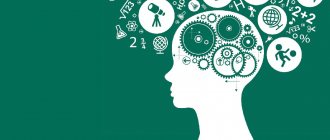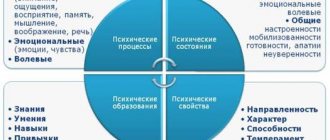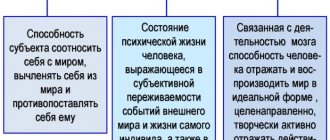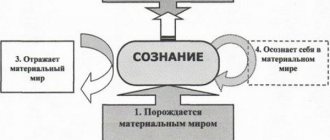General ideas about the psyche
The psyche is a multifaceted construct that determines a person’s personality. There are several links in it:
- Mental processes. These are dynamic indicators that are criteria for understanding the world, help to take and analyze information from everything that surrounds a person, form his emotions in a specific episode of life, his behavior, goals and motives, and also regulate communication, depending on the situation, changing gestures and posture, volume and tone of voice, facial expressions. In the process of personality development, they constantly vary.
- Mental properties. Properties include:
- temperament, which is established at birth;
- character, which, when studying personality, also turned out to be largely dependent on the hereditary factor and only 10% on the external one;
- abilities that are both inherent in nature and formed during the development of the individual.
Properties are a static concept, but are subject to relative variation when exposed to a prolonged irritating factor.
- Mental states. Determines exactly which processes and properties of a person will manifest themselves in a given situation and which of them will prevail over others.
Mental properties: temperament
Definition 1
Temperament is understood as a set of stable, individual, psychophysical characteristics of an individual that determine his mental activity and behavior.
Temperament can manifest itself in general activity, in the motor sphere, in the emotional sphere.
The speed of action of an individual’s mental processes, as well as the speed of conditioned reflexes, depends on the type of temperament.
Personalities by temperament type are as follows:
- choleric (fast, unbalanced, emotional, quickly exhausted)
- phlegmatic (slow, imperturbable, stable mood, not emotional)
- sanguine (alive, mobile, quickly reacts to current events)
- melancholic (excited, have an acute painful reaction to what is happening, impressionable, vulnerable)
Psychological states as the main criteria for personality research
A person's personality in a particular situation is reflected by the psychological state that shapes its response to a stimulus. That is, some emotions prevail over others, gestures change, behavior changes, sometimes even motivation and other processes. The state is a relatively static indicator, however, with long-term identical stimuli, the time-varying state turns into a practically non-variable property.
In the process of personality research, the following components of the mental state were identified:
- Physiology (physical indicators, for example, pulse);
- Motor functions (facial expressions, speech, etc.);
- Emotions (depending on the situation, both positive and negative);
- Cognitive processes (the ability to adequately think, think through your further actions, analyze the situation);
- Behavior (any actions caused by a specific situation);
- Communication skills (the ability to contact and adequately communicate with a person).
All psychological states are divided into two groups: situational and stable (personal). Each group has its own classification.
Situational states are characterized by instability and the individual’s response to a certain atypical situation. They can be:
- general-functional;
- mental stress;
- conflicting.
Stable, that is, those that persist for a long time, are divided into:
- optimal or crisis;
- various borderline states (dementia, psychopathy);
- disturbances of consciousness.
It is necessary to dwell separately on crisis conditions, which can manifest themselves in the form of:
- negativism (the predominance of negative emotions even under optimal conditions);
- opposition (aggression in certain similar situations or towards certain individuals, but similar by some criterion);
- autism (complete social withdrawal).
Yu. V. Shcherbatykh is the founder of another classification of mental states. The classification is presented in the form of a table and thanks to it you can calculate the formula for a certain state, for example, fear or admiration. The table examines 7 criteria, each of which is divided into transitional and extreme variants of the mental state.
Mental properties: character
Definition 2
Character is a group of basic personal characteristics; these characteristics control human behavior. A person’s character is manifested in his attitude towards himself, towards other people, towards work, towards things; character also reflects the qualities of a person’s will.
The German psychiatrist and psychologist E. Kretschmer divided personality into two types:
- cyclothymic
- schizothemic
These two types of character are similar to the characters of mentally ill people, but are the norm.
The cyclothymic character is similar to the character of patients with affective disorders, the schizothemic character is similar to the character of patients with schizophrenia.
In psychology, they distinguish such a character property as accentuation; this definition means an extreme degree of the norm, the strengthening of individual traits, which can lead to a personality disorder.
Criteria for a mature personality
Before conducting personality research, you should decide on the criteria that a formed, holistic personality must meet. There is no general approach to this concept, but it is customary to consider the most reliable criteria of V.V. Petukhov, who claims that a person:
- must be capable of creativity;
- can be multiple with simultaneous integrity;
- is constantly evolving.
L. I. Bozhovich approached the question more simply, highlighting only two criteria for an individual: the ability to set priorities, sacrificing one’s “want” for the sake of “need,” as well as the ability to manage one’s actions, setting goals and overcoming obstacles.
Human needs
Orientation determines the mental properties of a person and has its own internal structure, which includes goals, motives and needs. The latter are a person’s need, if we talk about him as a socio-biological being, for a certain material or spiritual object. Needs must be satisfied, they encourage the individual to show the necessary activity, to carry out certain activities. According to the direction, needs as mental properties are divided into spiritual and material.
The needs of animals are mainly at the level of instincts, they are limited mainly to material or biological needs, the mental properties of a person are formed, change and multiply during his life process, this is determined by the level of production in society and social relations. In addition, even the external environment actualizes the formation of various needs at all stages of people’s life.
Needs, as a structural element of personality direction, have a number of specific features. For example, they are meaningful and specific in nature, which is associated with any activity or subject that people need. Further, awareness of the need is accompanied by a certain emotional state. Another feature of the need is the presence of a volitional component, which is focused on finding possible ways to solve the problem and satisfy the need.
A person’s mental properties, spiritual and material needs influence the formation of goals, which are aimed at achieving existing needs. In personality psychology, this concept is used to study intentional actions that represent specific features of human activity. In this case, goal formation is considered as the main mechanism for the formation of certain actions.
Motive also refers to the mental properties of a person and is a direct internal urge to perform a specific action in order to achieve a goal. The certain content of the motive is characterized by the objective conditions of human life. When social conditions change, the prerequisites for the development of any motives, which appear in the form of stable and situational ones, also become different. The mental properties of a person, the direction and content of motives characterize not only the fact of the presence of a certain type of activity, but also its direct effectiveness. The influence of motive on the specifics and structure of memorization processes has been experimentally proven.
Other psychological personality traits include ability, temperament, and character. There are 4 types of temperament:
- Choleric temperament
- Sanguine temperament
- Phlegmatic temperament
- Melancholic temperament
Character is formed on the basis of the manifestation of the temperament of the human personality in certain social conditions.
Psychological studies of personality
All research methods are divided into 4 categories, united by some common approach to the study of personality.
- Observation. The main ways to assess a personality are through examination, questioning both the person himself and those around him, reading the medical history, if any, reading diaries or autobiographies. The last two sources, as practice shows, are very valuable information.
- Experiment. Includes various studies using equipment. It is also possible to simulate some emergency situations or situations that are important for a particular person to assess his mental state.
- Questionnaires and other similar techniques. They allow you to evaluate many criteria: motivation, focus, self-esteem, willpower, etc.
- Design. Using the techniques of this area, the personality as a whole is determined, without highlighting its individual criteria.
However, in practice all 4 methods are actively used, which can also be mixed, complementing each other, so their separation is conditional.
Mental properties: motivation
The basis of life and the evolution of all life on earth is motivation. Motive is understood as an urge to act in order to satisfy an urgent need.
Human needs are very diverse. Human needs are divided into two categories:
- material (food, heat, water, air)
- spiritual (communication, activity, knowledge, creativity.
Motives are divided into:
- lower or biological (drives, desires, satisfaction of physical needs)
- higher or social (interests, ideals, beliefs)
This is interesting
The experimental method is subject to widespread criticism for reasons of humanity, but its results always turn out to be the most reliable and interesting for science. For example, Stanley Schachter conducted a very interesting experiment, during which it was found that in an emergency, life-threatening situation, a person prefers to be not alone, despite the understanding of joint death. Further research showed that a person prefers to be close to someone who experiences the same fears or emotions as him. That is, in a threatening situation, a person needs not just a friend, but a “suffering” friend.
Based on the conducted personality studies, it is possible to reliably determine all the criteria and indicators of a person’s psyche in order to create a holistic personal portrait.
Mental properties: abilities
A person’s ability is a fairly constant value; it distinguishes one individual from another and determines a person’s achievements in certain types of duration.
Ability is not the same as skills, knowledge, abilities, but ability helps to master new knowledge, skills and abilities.
Abilities are:
- natural (associated with innate inclinations)
- specific (have a socio-historical origin)
Specific abilities, in turn, can be general, special, theoretical, practical, educational and creative.
Personality orientation, character and temperament
Taking into account the personal characteristics of a person, you can help him achieve success in life, achieve better results, and become successful in school and work. The basis of personality orientation is motivation, which implies satisfaction of needs.
Some people are quite satisfied with satisfying only physiological needs. They are characterized by inertia and unwillingness to change anything in life. This type of behavior can form a melancholic person.
Other people are interested in realizing their own creative potential, satisfying social needs for communication, social growth, which is typical for sanguine and choleric people. But the direction of personality can be coordinated, regardless of the initial temperament. You just need to act differently in each case.
Sanguine - “trust, but verify”
Sanguine people tend to get carried away and always happily respond to everything new in life. Their responsiveness and sociability become the basis for their success. But exactly until they turn into frivolity, over-communication and unreliability.
The principle of working with a sanguine person is control and verification, since he does not always fulfill what he promises. Frivolity can be harmful, so it is important for sanguine people to instill perseverance and the habit of finishing what they start.
Choleric - “not a moment of peace”
The best option for developing the personality of a choleric person is to use his vigorous energy to the fullest. Such a person must be busy all the time. His energy is enough for everything: studying, playing sports, meeting with friends, working.
As long as he is passionate, he is cheerful, achieves his goals and, most importantly, they come easy to him. If a choleric person finds himself “out of work,” he begins to demonstrate temperament, aggression, incontinence, and conflict. In a team, he may well direct his energy in a dangerous direction - to destroy the built system, so by loading him with several projects, you can avoid such a danger.
Phlegmatic - “don’t rush”
Phlegmatic people seem slow and “thick-skinned,” but at the same time they are constant, patient, and most importantly, reliable. To help a phlegmatic person show his positive qualities, he cannot be rushed. In conditions of time shortage such a person cannot work. And if you don’t push him, but give him the opportunity to work at his own pace, he will do the job perfectly.
Melancholic - “do no harm”
People around me strive to take advantage of the goodwill and ability to sympathize with melancholic people. Their gentleness and humanity are good within the family, but in society they often become victims of aggression or submit to other people's demands. Their vulnerability and shyness interfere with achieving success, so when shaping the orientation of a melancholic person, one must be careful.
Shouting, pushing, setting strict limits is not for them. The attitude should be soft, and when communicating with a melancholic person, it is important to maintain a positive attitude, since he is sensitive even to the intonation of speech.
“Contact a psychologist to analyze your team,” advises Maria Roshchina, “and distribute tasks so that all its members rush to work and want to show results.”
What is temperament and character
Science believes that temperament plays a primary role in the formation of individual personality traits. It is what is called the “biological foundation” on which personality traits are built: stability of emotions, impressionability, energy, adherence to a certain pace of life, reaction to external factors.
Temperament can be considered an innate tendency - it does not change over the course of life. It also determines the characteristics of a person’s behavior and reactions, regardless of what activity he is engaged in.
Among the properties of temperament are:
- reactivity - the degree of a person’s reaction to an external stimulus, be it an event or an offensive word thrown at him;
- activity - energy, which shows how intensely a person strives to influence the outside world;
- plasticity - the ability to adapt to external conditions and obey them;
- rigidity - inertia of behavior in a given situation;
- emotional excitability - the strength of the emotional reaction and the speed of its occurrence.
On the basis of these mental traits, character is built - a system of human characteristics that shows or allows one to predict his actions and behavior in a specific situation. Speaking about character, we mean a set of traits that are most noticeable in a person’s behavior, for example:
- frivolity or thoughtfulness;
- courage or cowardice;
- conscientiousness or lack of seriousness in performing work.
“A person needs character in order to survive in the world and society,” comments psychologist-coach Maria Roshchina. — One of its frequent manifestations is heroism. A person strives to be a hero, and this is natural, since it brings satisfaction. But since there are few opportunities for heroism in everyday life, people tend to create such situations. Examples of this include fashion, television, religion, and supporting your favorite sports team. By joining one of the “trends,” a person can feel like a hero without doing anything heroic.”










